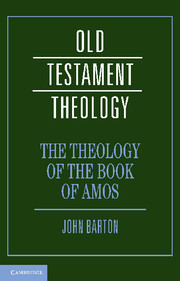Book contents
- Frontmatter
- Contents
- General Editors’ Preface
- Preface
- Abbreviations
- Chapter 1 Amos: The Critical Issues
- Chapter 2 Religious Belief and Practice in Amos’s Day
- Chapter 3 The Theology of Amos and His Circle
- Chapter 4 Theological Themes in the Additions to the Book of Amos
- Chapter 5 The Theology of the Book of Amos
- Chapter 6 The Reception of the Theology of Amos
- Chapter 7 The Theology of Amos Then and Now
- Further Reading
- Author Index
- Scripture and Apocrypha Index
- References
Chapter 3 - The Theology of Amos and His Circle
Published online by Cambridge University Press: 05 June 2012
- Frontmatter
- Contents
- General Editors’ Preface
- Preface
- Abbreviations
- Chapter 1 Amos: The Critical Issues
- Chapter 2 Religious Belief and Practice in Amos’s Day
- Chapter 3 The Theology of Amos and His Circle
- Chapter 4 Theological Themes in the Additions to the Book of Amos
- Chapter 5 The Theology of the Book of Amos
- Chapter 6 The Reception of the Theology of Amos
- Chapter 7 The Theology of Amos Then and Now
- Further Reading
- Author Index
- Scripture and Apocrypha Index
- References
Summary
Despite many of the arguments in Chapter 2, it would be a mistake to think that Amos’s teaching was simply the negation of the religious assumptions of his audience, as though everything he said was totally original and unprecedented. As we have already seen, there were important areas in which he and his hearers clearly shared the same assumptions. Like them, for instance, Amos believed that the power of Yhwh extended over all nations of the world, and that he controlled the destinies of all. He also agreed that Yhwh would avenge atrocities committed in war, whoever committed them and against whomever they were committed. There was thus a wide base of theological agreement. Amos was not the first person in Israel to believe in the universal power of Yhwh, and thus there were already before his time signs of a kind of incipient monotheism.
Israel’s Non-Election and the Coming Disaster
The first thing we notice in the message of Amos is that he draws different conclusions from those drawn by his contemporaries from this agreed-upon universal power of the God of Israel. Two verses in particular stand out: Amos 3:2 and 9:7.
- Type
- Chapter
- Information
- The Theology of the Book of Amos , pp. 70 - 106Publisher: Cambridge University PressPrint publication year: 2012

